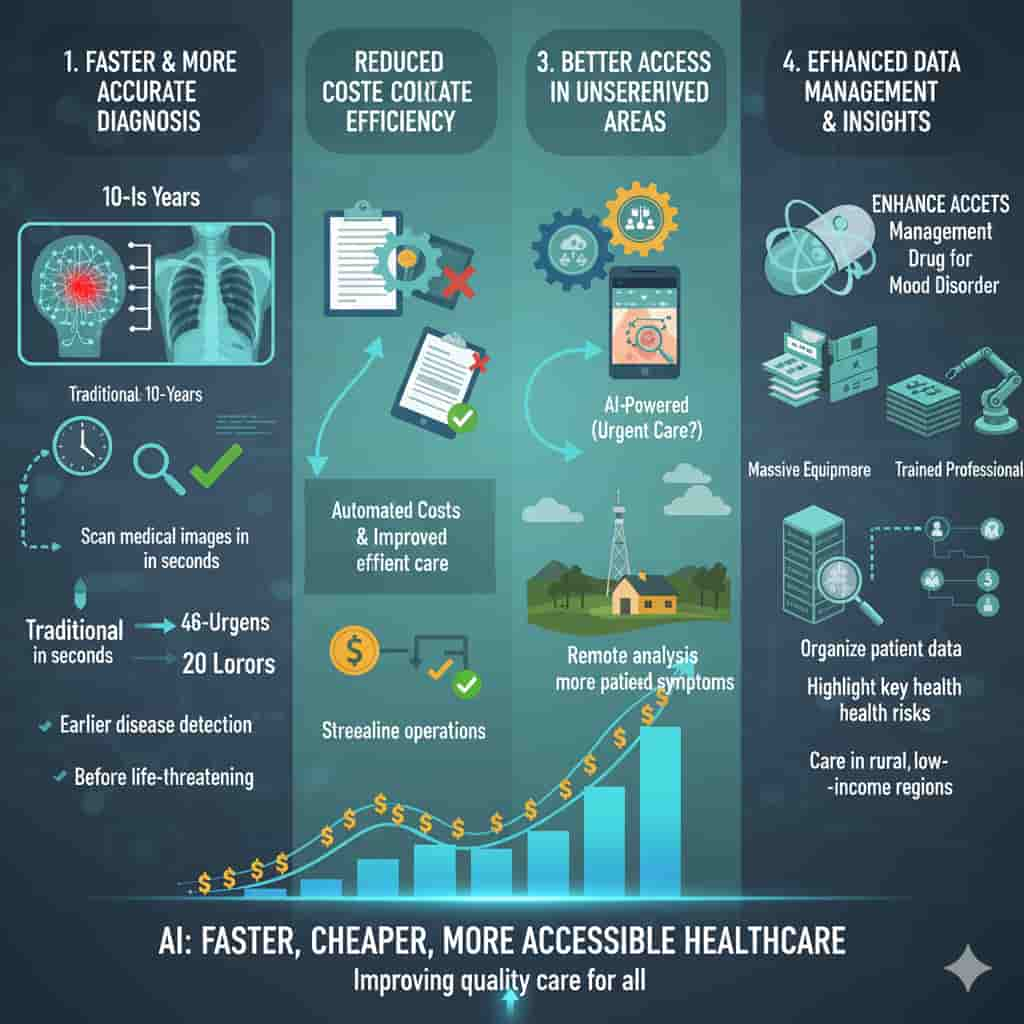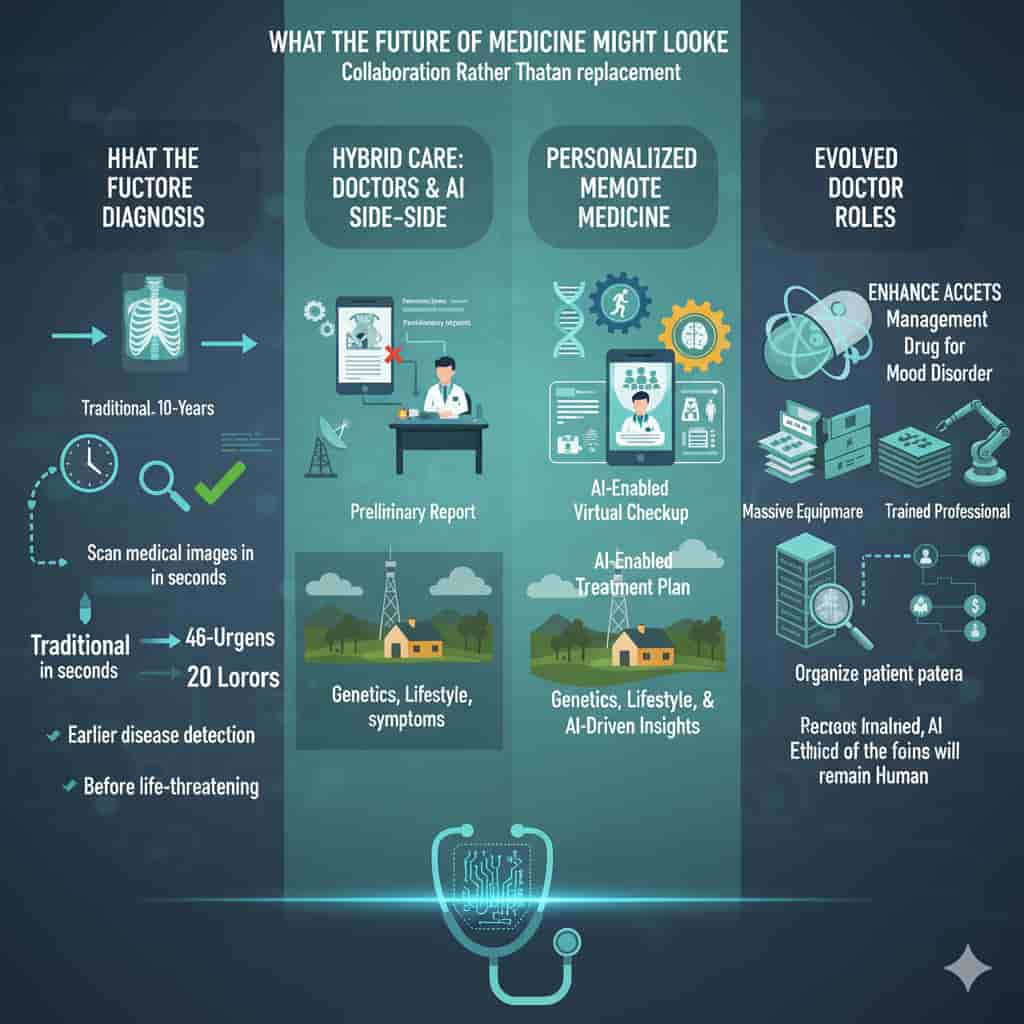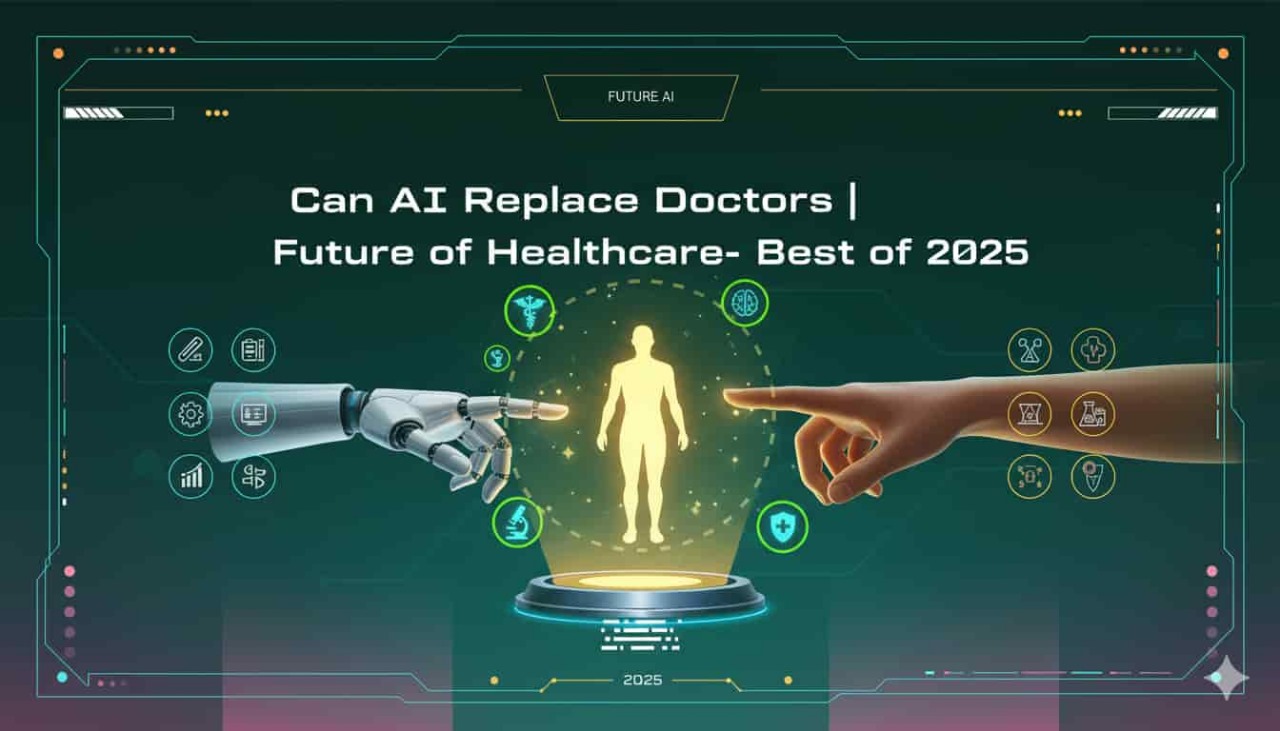1. Introduction
Artificial intelligence (AI) is transforming healthcare at flash speed. From reading medical scans to predicting malady, AI is stepping into roles once reserved for doctors. But the big question remains: can AI Replace Doctors , or will it simply become a powerful tool in their hands.
2. What is AI in Healthcare?
Artificial intelligence in healthcare refers to the use of computer systems that can “learn,” analyze, and make conclusion much like the human brain—but often at a faster pace. Instead of relying on gut instinct or memory, AI systems process massive sum of medical data to identify patterns, predict outcomes, and suggest treatments.
For example, an AI program can analyse thousands of X-rays within seconds and flag potential tumors more consistently than a tired radiologist at the end of a long shift. Virtual assistants, like medical chatbots, can answer patient questions about symptoms or medications. Predictive analytics tools, battery-powered by AI, can anticipate which patients are more likely to develop conditions like diabetes or heart disease.
Think of AI as a supercharged assistant. It doesn’t replace human curiosity or compassionateness, but it can quickly analyze information that might take years for a person to sift through. Just as calculators didn’t eliminate mathematicians but assist them solve bigger problems, AI is shaping up to do the same in medicine.
3. How AI is Currently Used in Medicine
Diagnostic Imaging and Pattern Recognition
AI systems excel at spotting patterns in images. In medical science, dermatology, and pathology, AI replace doctors AI tools can detect tiny abnormalities in X-rays, MRIs, CT scans, or skin photos. For example, some AI replace doctors it programs can catch early signs of lung cancer or polygenic disorder eye disease before human doctors would normally detect them.
Virtual Health Assistants and Chatbots
Chatbots and digital assistants help answer persevering questions, schedule appointments, or guide them through recovery steps. These tools make healthcare more accessible by providing instant outcome to basic concerns, reducing the load on doctors and nurses.
Predictive Analytics for Treatment Planning
Hospitals use AI to foretell patient outcomes. For instance, algorithms can analyze lab results, lifestyle habits, and medical histories to forecast who might be at higher risk of abide by. This helps doctors intervene earlier, improving patient safety.
Robotic Surgery and Automation
Robotic-assisted operation, guided by AI,AI replace doctors, allows for more precise operations with small incisions, quicker recoveries, and reduced errors. Meanwhile, automation is being used in tasks like drug dispensing and lab work, saving time and minimizing human error.
In short, AI is not yet woven into many corners of medicine, quietly working behind the scenes to support better care.
4. Benefits of AI in Healthcare
1. Faster and More Accurate Diagnosis
AI replace doctors AI can scan through surgical images or test results in seconds, identifying conditions earlier than human doctors. This speed can mean catching a disease before it becomes life-threatening.
2. Reduced Costs and Improved Efficiency
AI helps hospitals streamline administrative work, from processing insurance claims to scheduling surgeries. By automatize repetitive tasks, healthcare providers can focus on patients rather than paperwork, ultimately reducing costs.
3. Better Access in Underserved Areas
In rural or low-income regions where doctors are scarce, AI-powered tools can step in. For example, mobile apps can study a photo of a rash or cough symptoms and suggest whether the patient should seek urgent care.
4. Enhanced Data Management and Insights
Doctors deal with overwhelming amounts of patient data. AI instrumentality can organize this information, highlight key risks, and even recommend personalized treatment plans.
These benefits propose that AI has the potential to make healthcare faster, cheaper, and more accessible—an attractive promise in a world where many people battle to get quality care

5. Limitations of AI in Healthcare
1. Lack of Empathy and Human Touch
AI cannot provide affectional support, comfort, or compassion—the prime many patients value most during difficult times.
A machine can explain treatment options, but it can’t hold a patient’s hand or understand their fears.
2. Ethical and Privacy Concerns
AI systems rely on vast amounts of patient data. This raises big questions: Who owns the data? How secure is it? Could sensitive health information be misused?
3. Risk of Errors and Over-Reliance
While AI can outperform humans in certain tasks, it isn’t perfect. A diagnosing from an AI system could have serious consequences, especially if doctors blindly trust its recommendations without double-checking.
4. High Costs of Implementation
Installing AI systems, training staff, and keep technology are expensive. Smaller hospitals may struggle to afford these tools, creating a gap between wealthy and resource-poor care facilities.
These bound remind us that AI is not a magic solution but rather a tool with both strengths and weaknesses.
6. Will AI Replace Doctors or Assist Them?
This is the heart of the debate. Let’s look at both sides.
The Case for Replacement
AI is already better than humans at certain tasks, such as analyzing medical scans, processing data, or foretell disease risks. Machines don’t get tired, distracted, or unemotionally biased. In theory, this could lead to a future where some diagnostic and administrative tasks no longer require doctors at all.
The Case for Assistance
But being angstrom unit doctor isn’t just about making calculations. Doctors build trust, comfort patients, and weigh personal values in treatment decisions. These human prize are irreplaceable. Even when AI makes a suggestion, a human doctor must interpret it in the context of the patient’s life, preferences, and emotional state.
Future Outlook
The apt future is not one of replacement but partnership. Doctors will work alongside AI, much like pilots use autopilot systems. Autopilot can handle most of the flying, but the human pilot is still essential for judgment, decision-making, and emergencies. Likewise, AI may handle the heavy lifting of data analysis, while doctors focus on empathy, communication, and ethical choices.
In other words, AI won’t replace doctors—it will give them superpowers.
7. How AI Could Change the Doctor–Patient Relationship
As AI come in the exam room, the doctor–patient relationship will necessarily shift.
Patients may begin to trust AI tools as much as they trust doctors, especially if AI consistently delivers accurate results. But this could also create tenseness: if an AI suggests one treatment and a doctor suggests another, who does the patient believe?
Doctors may also spend less time diagnosis and more time guiding patients through decisions. This shift could free up time for deeper conversations, but it could also risk personalize care if technology takes center stage.
Ultimately, the challenge will be balancing the speed and exactness of AI with the warmth and sympathy that only humans can provide.
8. Ethical and Legal Challenges
1. Accountability in Case of Misdiagnosis
If an AI system gives the wrong diagnosing, who is responsible? The software developer, the hospital, or the doctor who trusted the tool? Clear laws don’t exist yet, making this a gray area.
2. Patient Data Security and Privacy
AI thrives on data, but storing and sharing health information opens the door to hacking or misuse. Ensuring that group are secure and private is essential to maintaining patient trust.
3. Bias and Fairness in AI Systems
AI learns from data, but if that data point biases (for example, underrepresenting certain ethnic groups), the system may deliver unfair or inaccurate results. Addressing these biases is critical to making AI safe for everyone.
Until these ethical and legal speech act are addressed, AI will remain a double-edged sword in medicine
Read more: AI is Coming for Every Medical Specialty (Yes, Even Yours)
9. What the Future of Medicine Might Look Like
Looking ahead, the future of medicine appear to point toward collaboration rather than replacement.
In the next 10–20 years, we may see “hybrid care” where doctors and AI tools work side by side. For example, a patient might upload symptoms to an app that generates a prelude report, which the doctor then reviews and personalizes.
Remote care will also grow, with AI enabling virtual checkups for patients in faraway regions. Personalized medicine—tailoring treatments based on genetics, lifestyle, and AI-driven insights—will become the norm.
Doctors will still be central to health care, but their roles may germinate. Instead of spending hours analyzing data, they’ll focus more on patient communication, empathy, and ethical decision-making.
In short, the medical instrument of tomorrow may be powered by AI, but the heart of medicine will remain human.
Read more: When Will AI Replace Doctors? It’s Sooner Than You Think

10. Frequently Asked Questions
1. Can AI make medical decisions on its own?
Not entirely. AI can suggest diagnoses or treatments, but final decisions are usually made by doctors who consider the patient’s overall situation. It also AI Replace Doctors.
2. Are AI diagnoses more accurate than doctors?
In some areas, like image analysis, AI can match or even surpass human accuracy and AI Replace Doctors . But it lacks the full context and judgment that doctors bring to the table.
3. Will patients trust AI doctors?
Trust will depend on transparency and proven results. Many patients may trust AI for second opinions but still prefer human doctors for final decisions and now AI Replace Doctors , AI Replace Doctors.
4. How secure is my health data with AI systems?
We know AI Replace Doctors. Security depends on the safeguards in place. Leading healthcare providers use encryption and strict privacy rules, but no system is 100% immune to breaches.
5. What jobs in healthcare are most at risk from AI?
Administrative roles, such as billing or scheduling, are most at risk. Doctors and nurses, who provide human interaction, are less likely to be replaced. It also AI Replace Doctors.
6. Will AI reduce the cost of healthcare?
Potentially. By streamlining processes and reducing errors, AI can lower costs, but the initial investment is high. Now AI Replace Doctors .
7. How do doctors feel about AI in medicine?
Reactions are mixed. Some see it as a helpful tool, while others worry it could reduce their autonomy or overwhelm them with new responsibilities.
8. What role will human empathy play in future healthcare?
Empathy will remain irreplaceable. Patients don’t just want answers—they want understanding, comfort, and reassurance that only humans can provide.
Read more: AI in Drug Development 2025 : Can Technology Cut the Cost of Medicine?
11. Final Thoughts
So, can AI replace doctors? The short answer is: not entirely. AI Replace Doctors , AI is potent, but it lacks the empathy, ethics, and human judgment that define good medicine. Instead of replacement doctors, AI is more likely to become their most valuable partner—one that makes healthcare smarter, faster, and more reachable for everyone.

